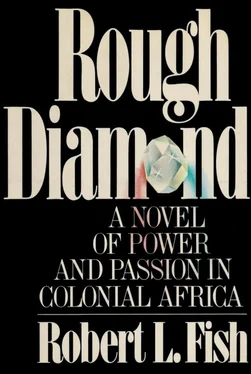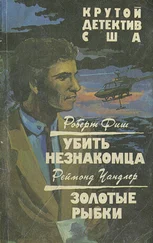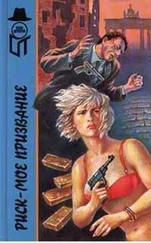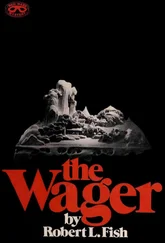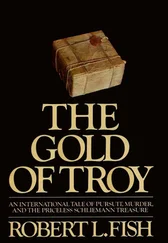Rhodes came to his feet, his temper now under icy control since he now knew what he would have to do. It was what he should have done in the first place without demeaning himself, subjecting himself to the insulting behavior of this obnoxious little kike. There was no need for the board to even know about it, but he had recognized the possible need for it when he had gotten their permission to handle things his own way if necessary.
“You’re making a mistake, Barnato,” he said coldly.
“One more mistake won’t kill me,” Barney said calmly. “But I wonder if I could ask you a favor.”
“What?”
“Don’t slam the door on your way out.”
“You should have seen his face!” Barney said with delight to Fay at supper that night. “The great Cecil Rhodes! Somebody wouldn’t give him a candy stick. I thought he’d burst into tears!”
“Barney…” Fay’s tone was doubtful.
Barney seemed to notice Fay’s frown for the first time. “What’s the matter? You certainly didn’t think I’d sell the companies, did you?”
“Of course not. But, darling, I understand he’s a bad man to have for an enemy…”
“Honey,” Barney said philosophically, “there ain’t — I mean aren’t — any bad men it’s good to have for an enemy.” And having delivered himself of this brilliant maxim, he promptly forgot the matter and tackled the food being brought to them from the hotel kitchen.
Cecil John Rhodes was having a drink with his old friend, the mayor of Kimberley, Joseph Benjamin Robinson. Without appearing to do so, Rhodes had managed to sequester Robinson into a corner of the Kimberley Club bar that gave more privacy than any other. Their drinks ordered and served, Rhodes took a sip of his whiskey and looked at the mayor.
“Joe,” he said conversationally, “how’s the Illicit Diamond Detection Squad doing?”
Robinson shrugged. With his ever-present sun helmet still in place despite the heat of the room, his face was in shadow, but his expression could have been calculated from the tone of his voice. “The trouble is we don’t have enough men. Trained or otherwise. It’s a matter of money, of budget.”
It was the answer Rhodes wanted, nor was it at all unexpected. Robinson’s editorials on the matter were common fare in the columns of his newspaper, the Independent.
“A pity,” Rhodes commented idly, and waited.
“Yes. Now, if some of the interested parties, the ones who are suffering the most from the illicit trade,” Robinson went on with a touch of asperity, “would realize it would be in their own best interests to chip in some money to hire more men — preferably properly trained men — then maybe the squad could be more effective, accomplish more. But no!” The fact that Robinson himself was owner of the Standard Company, and as such fell into the category without donating a penny to that program or any other, did not seem to occur to Robinson. The job of mayor, while it paid very little, gave honor and prestige, and after all, Robinson made his money with the Standard mine and his newspaper.
Rhodes managed to look ashamed; it was no easy task for him.
“You’re absolutely right, Joe,” he said at last, staring down at his drink in an abashed manner. “But you know, with the costs of digging today, and the price of diamonds in London falling daily…” He suddenly looked up as an idea struck him. “However, I happen to have a trained man, an ex-policeman from Cape Town, as a matter of fact, that I brought up here to be one of the guards at one of the compounds. With the diamond market what it is, we can spare men. Why don’t I let you have him to put on the Diamond Detection Squad? I’d keep him on my payroll, of course,” he added magnanimously, quickly.
“I’ll take him,” Robinson said equally quickly, and smiled. “I don’t even care if he’s Kaffir or purple in color. I’ll take anyone at this point. You say he’s trained?”
“Yes. He’s an ex-bobby from the Cape and as tough as they come. He’s the perfect man for the job,” Rhodes said quietly, and ostensibly changed the subject. “Joe, speaking of illicits, don’t you find it a bit strange that Barnato seems to be taking more diamonds from his share of Kimberley than either you or Baring-Gould?”
Robinson considered his companion carefully. He knew Rhodes for what he was and he had no illusions as to the fact that Cecil Rhodes had no morals at all where his immediate interests were concerned.
“There’s never been a word against Barnato in that respect,” he said quietly. “I hate the Jew as much as anybody, Cecil, as you well know. But if the illegal diamond dealing is to be stopped, then chasing rainbows just because we’d all like to find a particular pot of gold at its end is no way to go about it.”
“I only said—”
“I heard what you said,” Robinson said, and was surprised a bit at his own temerity in facing Cecil Rhodes in that fashion. Although in a way it was a shame that Barney Barnato was innocent of illicit diamond dealing…
It had taken Cecil Rhodes a bit of money and a little time to locate Carl Luckner and bring him to Kimberley from Cape Town where he had been working as a bouncer in a combination bar and whorehouse, but it had been necessary before his talk with Robinson. Rhodes had no fear of Robinson: the old man was weak when it came down to basic intestinal fortitude and would end up doing what he was told if he knew what was good for him.
The story of Luckner’s fight with Barnato at the Paris Hotel had gone through Kimberley the day after the fight, and although it was now years old, it had never escaped the mind of Cecil Rhodes that the Jew Barnato had undoubtedly made an implacable enemy — another enemy, that was. Now that Luckner stood before him, looking at him with those slitted eyes, his mustache bristling, the scar along his jaw livid, Rhodes studied the man coldly, as he would any other tool he had to use in the digging of diamonds, or the eventual control he intended to exercise over the entire industry. What he saw pleased him. Here was a man obviously without scruples, which was exactly what Rhodes wanted.
Luckner returned the inspection with equal coldness. The man facing him behind the large desk, with his wide shoulders and big head and those icy hooded eyes, was as well known now in Cape Town as he was in Kimberley. As the newly elected representative of the diamond district in the Cape Assembly, he was a universally recognized figure in the capital and was often in the news. Luckner decided enough time had been wasted.
“You wanted to see me, Mr. Rhodes?”
“Yes.” Rhodes reached for a pencil and began to twiddle it as he spoke. “How would you like to get back on the police?”
“In Cape Town?”
“No, here in Kimberley. Not the regular police force, but a special branch. The Illicit Diamond Detection Squad. Under John Fry. Do you know John Fry, Mr. Luckner?”
“I knew him when he was on the force in Cape Town. Why?”
“You know, of course, that Fry is supposedly totally honest. Are you totally honest, Mr. Luckner?”
Luckner smiled, a grim smile with no humor in it. “Mr. Rhodes, if you wanted an honest man, you wouldn’t have sent all the way to Cape Town for me. There has to be at least one honest man in Kimberley. Exactly what is it you want, Mr. Rhodes? And,” he added, “what would it pay?”
Rhodes smiled, comfortable with the answer, as he continued to play idly with the pencil. “I want you to settle an old debt. An old debt of yours, that is. Together with a new debt of mine. And it will pay one thousand pounds. Is that satisfactory?”
Luckner’s eyes narrowed even further. There was only one answer to money like that. “You want somebody killed, obviously. Who? Barnato?”
Читать дальше
